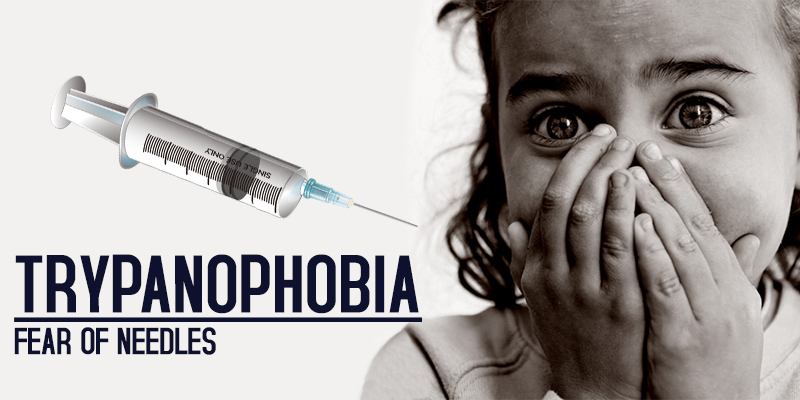Needles and injections have become an integral portion of medical treatment, thanks to the ever advancing science. However, even when the use of needles is something really inseparable during medical routines, many people tend to completely avoid the treatment due to the fear of needles and injections. Such extreme form of anxiety due to needles, syringes and injections is known as Trypanophobia.

Trypanophobia is closely related with another phobia known as Aichmophobia. Aichmophobia, also known as belonephobia or enetophobia, is the fear of pointed and sharp objects such as pencils, needles, pins, knives and sometimes even sharpened edges of tables and furniture. Trypanophobia may occur as a spinoff of other phobias such as haemophobia (fear of blood), algophobia( fear of pain) and vaccinophobia ( fear of vaccines).
How Common Is Trypanophobia?
Trypanophobia is a common fear, especially among children. In fact, adults having trypanophobia might have developed the fear in their childhood itself. At least 10 percent of people suffer from trypanophobia. Among these, 20 percent completely avoids any medical treatment to avoid needles and injections.
What Causes Trypanophobia?
The exact cause of the unexplainable fear of needles is still not known clearly. However, following factors have been associated with the phobia.
Related Distressful Event
Trypanophobia may develop as a result of a distressing medical routine where needles and injections have been frequently used. Many times, people develop the phobia during childhood itself through vaccinations and shots. It can also develop after seeing someone else getting pricked by needles and injections.
Some cases have also been seen where people developed the fear of needles due to fear of getting controlled or restrained. Particularly, the fear developed out of a past traumatic experience involving controlled and restrained upbringing.
Evolutionary Factors
Some research studies of evolutionary psychology have shown that the phobia of needles have been deep rooted in the evolutionary survival mechanism. In early civilizations, human beings developed defense mechanism in their natural trait against any kind of wounds, stabs and cuts. This could have been passed on to every generation since then, making some part of the population physically hypersensitive.
What Are The Symptoms of Trypanophobia?
Trypanophobia can occur in four major ways:
Vasovagal
A person having vasovagal trypanophobia faints immediately, have nausea or vomiting and low blood pressure triggered by pricking, or just a mere sight or thought of needles and injections.
Associative
A person having associative trypanophobia tends to relate every incidence of needles and injections with a previous traumatic experience faced by him/her or by a loved one. As a result, he/she might suffer from sleeplessness and panic attacks when a related event is anticipated such as vaccination.
Resistive
A person having resistive needle phobia might be resistive of needles due to a previous experience where needle routines have been mishandles, or conducted by physical and emotional force. The person shows aggressive behavior and high blood pressure when a related event is anticipated.
Hyperalgesic
A person having Hyperalgesic needle phobia is not fearful of the needles directly, but with the pain induced by the pricking of the needles and injections. The person acts extremely sensitive to pain, more than a normal person, and shows physical panicking symptoms.
Along with the above characteristics, general symptoms that occur in both children and adults are:
- Intense and persistent fear and anxiety induced by pricking of needles and injections, or an anticipated pricking
- Complete avoidance of medical procedures, even when needles are not required
- Immediate increase in blood pressure upon any event with needles, and a gradual drop thereafter
- Low blood pressure resulting in fainting and dizziness
- Extensive defiance before the use of needles and injections
- Agitation and violent behavior
- Panic attacks accompanied by signs such as shaking, trouble in breathing, sweating and clammy hands, racing heartbeat, nausea and vomiting, dry mouth, feeling like one is dying, or numbness around limbs
When to Visit a Doctor?
If the above symptoms have been occurring for more than a time period of six months, then you might want consulting with a doctor. Furthermore, it’s very important that you start the treatment as soon as possible as a prolonged phobia might keep you off from another required medical procedure.
How Is Trypanophobia Treated?
Composite therapies can help with bringing the phobia in control. In severe cases, medicines may also be used.
Exposure Therapy
Exposure therapy basically revolved around studying the hierarchy of the fear generated by the needles. The therapist would set up a similar scene or images of needles in front of the person, and analyze the response. The major aim of exposure therapy is to slowly bring down the level of fear by regular and graded exposure to the fearful subject. For this, the therapist may use different relaxation ways such as breathing control, mental visualization exercise and even hypnosis to calm down the sense of the person.
Cognitive Behavioral therapy (CBT)
CBT is an essential therapy that is aimed at altering the negative thoughts surrounding the use of needles and injections. The therapist conducts counseling sessions to dig out the inner thoughts associated with the fear. CBT is focused on replacing such thoughts with more positive and suitable ones.
Medications
In severe cases, different medicines can be used to control the symptoms of anxiety. Commonly used medications include beta blockers, anti-anxiety and anti-depressant medicines to calm down the body sensations.